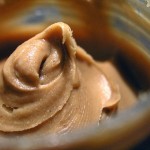Peanut Butter and Alzheimer?
 “Could a scoop of peanut butter and a ruler become that elusive test?”
“Could a scoop of peanut butter and a ruler become that elusive test?”
If you treat the elderly, or any member of the growing number of families devastated by Alzheimer’s disease, you may be asked some version of that question, as posed by CBS News, in the coming weeks. You can thank media coverage of a study in the Oct. 15 issue of the Journal of Neurological Sciences titled “A Brief Olfactory Test for Alzheimer’s Disease.”
Here’s that brief olfactory test, as the CBS headline suggests: “A container of 14 g of peanut butter was opened, held medially at the bottom of a 30 cm ruler, and moved up 1 cm at a time during the participants’ exhale. Upon odor detection, the distance between the subject’s nostril and container was measured.”
(If this sounds a bit strange to those who haven’t kept up with the Alzheimer’s literature, there have been a number of studies showing that the olfactory lobe is affected by the devastating neurological disorder.)
Reading CBS News’s headline, “Cheap Alzheimer’s Test Made From Peanut Butter and Ruler, Researchers Report,” reminded me of the old adage “Fast, good, or cheap: Pick two.”
A couple things made me wonder just how much of an advance this was:
- The study was small, fewer than 100 people all together, divided into four groups ranging from probable Alzheimer’s to healthy controls.
- The journal — which is not exactly a core clinical title — is ranked in the bottom third of neuroscience journals by Thomson Scientific’s impact factor, 162 out of 252. Wouldn’t the researchers have tried for a more prestigious, and clinical, journal first?
So we asked a range of Alzheimer’s researchers what they thought. Here’s a sampling:
Richard Caselli, MD, of the Mayo Clinic, Scottsdale: “I don’t think anyone will feel comfortable diagnosing AD on the basis of a smell test.”
Samuel Gandy, of Mount Sinai School of Medicine: “Smell tests for dementia screening have been proposed for years, but the lack of specificity has repeatedly undone the early claims. Ditto for eye tests. This might be the exception, but I would urge caution pending independent replication on larger numbers and diversities of subjects.”
George Bartzokis, MD, UCLA: “Do not dismiss the study. What is new here is simply what they used to test it out — peanut butter. The principal problem with smell tests is that they are nonspecific and therefore only one small piece of the diagnostic puzzle. Not only can you have some congestion in your nasal cavities that can reduce your smell on a temporary basis but a past head trauma, severe past sinus infections, etc. can do so on a permanent basis. Individuals may not even remember these past events or be aware of current sinus problems that could interfere with their ability to smell.”
To be fair, the authors of the study, including well-known Alzheimer’s researcher Kenneth Heilman, MD, also note caveats, including “that it cannot be reliably used in patients with comorbid dementias or that have a history of any other common cause of olfactory loss besides aging.”
So, not yet an Alzheimer’s test in a Jif, as a colleague’s husband quipped. (In case you’re wondering, the NIH, not the National Peanut Board, funded the study.)
While I’m on the subject of Alzheimer’s, find some time to read the gripping accounts of living with the disease that physician David Hilfiker, MD, is sharing with the world on his blog, “Watching The Lights Go Out.” It’s been a must-read of mine for months.
The study was published in the Journal of the Neurological Sciences.
